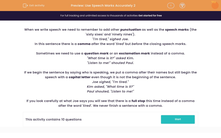When we write speech, we need to remember to add other punctuation before the closing inverted commas (speech marks).
"I'm tired," sighed Joe.

In this sentence, there is a comma after the word 'tired' but before the closing inverted commas.
Sometimes, we need to use a question mark or an exclamation mark instead of a comma.
We use a question mark if the person speaking is asking a question:
"What time is it?" asked Kim.
We use an exclamation mark if the person speaking is shouting or saying an exclamation:
"Listen to me!" shouted Paul.
If we begin the sentence by saying who is speaking, we put a comma after their names but still begin the speech with a capital letter even though it is not the beginning of the sentence.
We call this part of the sentence the reporting clause.
Here are some examples of speech where the reporting clause is at the start of the sentence and followed by a comma:
Joe sighed, "I'm tired."
Kim asked, "What time is it?"
Paul shouted, "Listen to me!"
If you look carefully at what Joe says you will see that there is a full stop this time instead of a comma after the word 'tired'. This is because we can't finish a sentence with a comma.
That's a lot to think about, but remember that you can look at this introduction again at any point by clicking on the red help button on the screen.









